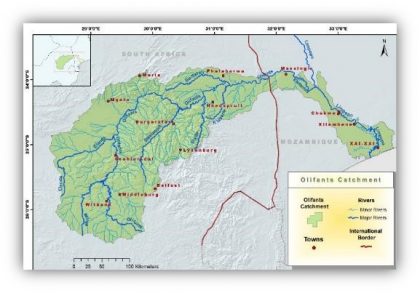
- Without a viable governance system, achieving water resources protection within IWRM will not be possible. Policies in both South Africa and Mozambique support decentralisation, stakeholder participation and catchment (or basin) approaches. Both countries have developed the institutional framework for catchment-focused water resources management through Catchment Management Agencies (or CMAs) in South Africa and Regional Water Authorities (or ARAs) in Mozambique. Of relevance are the Olifants CMA (OCMA) in South Africa and Ara-Sul (Administração Regional de Águas do Sul) in Mozambique.
- Despite excellent legislation and the development of tools such as FlowTracker and InWaRDS, these are only as good as the governance system they are embedded in. For this reason, AWARD has focused efforts on supporting OCMA/ DWS and Ara-Sul. Institutional uncertainty through the proposal to dis-establish the CMAs in South Africa from late 2017 into 2018 meant that we turned our attention to stakeholder networks and support for the DWS regional office.
- Catchment management forums need to structure participation from stakeholders in a way that is meaningful, open and democratic. AWARD has developed some guidelines for developing a charter to guide stakeholder involvement in water resource management processes. These guidelines will also help to establish a forum with clear functions and a purpose. The guidelines are not specific for a particular geographic area but general enough for inputs to be made relevant and appropriate.
 The Olifants River Basin (ORB): a transboundary system shared between South Africa and Mozambique.
Water security in the ORB is severely threatened by land and water-use activities including mining particularly in the upper and middle reaches, discharge effluent from waste-water plants, wide-scale increases in agriculture and urban areas. Flows have decreased substantially and water quality is some of the worst in the country. Climate change is projected to decrease water availability by about 24%.
Our work seeks to support IWRM and good resources governance to address these issues.
The Olifants River Basin (ORB): a transboundary system shared between South Africa and Mozambique.
Water security in the ORB is severely threatened by land and water-use activities including mining particularly in the upper and middle reaches, discharge effluent from waste-water plants, wide-scale increases in agriculture and urban areas. Flows have decreased substantially and water quality is some of the worst in the country. Climate change is projected to decrease water availability by about 24%.
Our work seeks to support IWRM and good resources governance to address these issues.
[column_content type=”resoucesBox1″ class=”” background=””] [/column_content]
[column_content type=”resoucesBox2″ class=”” background=””]
[/column_content]
[column_content type=”resoucesBox2″ class=”” background=””]
 [/column_content]
[column_content type=”resoucesBox2″ class=”” background=””]
[/column_content]
[column_content type=”resoucesBox2″ class=”” background=””]
Related Resources
- Overview of the Olifants Catchment (2014)
- Systemic, Social Learning Approaches to Water Governance and Sustainability in the Olifants River Catchment (Limpopo)
- Keeping the Olifants River Flowing: Systemic, collective action during the most severe drought on record
- Predicted Impacts of Climate Change on Water Resources of the Olifants River catchment
- Overview of water quality and quantity in the Olifants River catchment
- Status Quo of Wastewater Treatment in the Olifants River Basin
- Mangrove Restoration & Livelihood Support in Mozambique [Limpopo River Estuary]
- Catchment Management Forums: A Guideline for Developing Charters of Agreement

